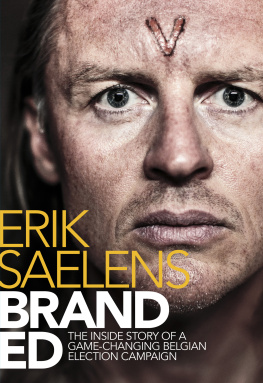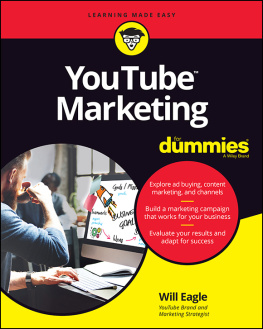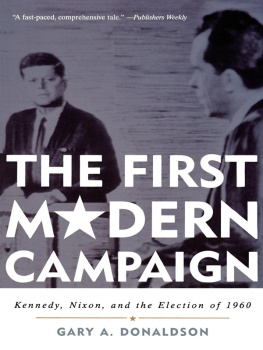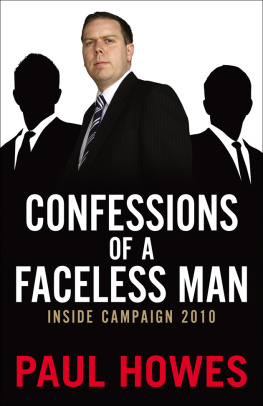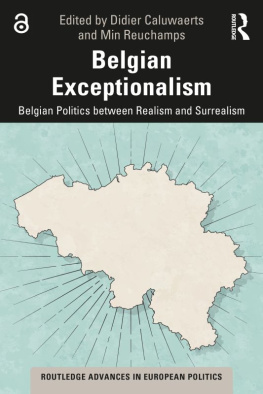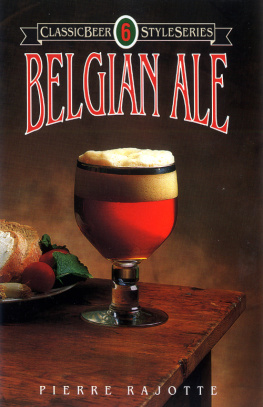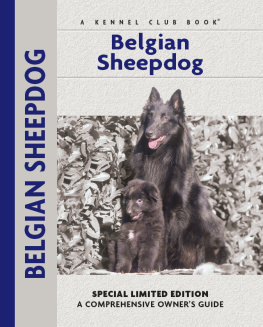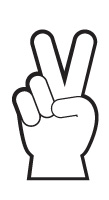
Vicit vim Virtus
courage has conquered violence
Bart De Wever, May 25, 2014, 9:02 p.m.
with thanks to
Bart De Wever, for his vision and trust
Ben Weyts, for his insight and brainpower
Piet De Zaeger, for his acuity and decisiveness
Joachim Pohlmann, for his predictions and humor
Liesbeth Homans, for her emotional vigor
Fons Duchateau, for his pragmatism and positivism
Sander Loones, for his structure and perspicacity
Nele Hiers and her team for their effectiveness
Jef, Joris, Peter, Sas and their teams for their creativity
Alec, Tom, Filip and their teams for their digital inventiveness
Rogier, Olga and their teams for their knowledge of production
my wife Machteld for her unconditional support and love
and above all infinite thanks
to all N-VA employees, politicians, militants, partners and party members, without whose efforts the N-VA would never have won these elections
Foreword
The essence of branding is that when you hear the name of a particular brand, or see an image associated with it (logo), a pattern is activated in your brain. A pattern that consciously or unconsciously evokes expectations, experiences, images and associations connected with that brand. In this respect a brand is like a computers operating system. It governs the way you form images.
The goal of branding is that you become less sensitive to changes the brand introduces. This could be a change in price, additional products or services offered by the brand, a bad experience you had with the brand, and so on. Still, because the brand has built up a degree of trust in your brain (and preferably your heart), it has a certain amount of credit and you remain loyal. But sometimes the brands credit runs out. This can happen because of bad experiences with the brand, because the brand has been dishonest with you one time too many, or because a new brand has appeared on the scene that promises to be more meaningful to you. Deep in your subconscious, you become disappointed with your current brand; you turn your back on it and choose a new brand. In fact, brands fight for your trust and loyalty. Both in your brain consciously or unconsciously and in your heart.
This book is about such a battle. The battle between the brand N-VA and all the other political brands that angled for Belgian votes on May 25, 2014. And about the role that my Brandhome team, the N-VA team, several loyal partners and I played in that period. What is certain is that this period will go down in the history of Belgian political marketing as a textbook example of a failed everyone against the N-VA strategy. About how that everyone against the N-VA strategy had the opposite effect, and actually convinced people to vote for the N-VA. Because the real holders of power in this country the voters are not stupid. Like you, they are connected. Like you, they are informed. Like you, they are tired of political brands talking to them as if they were children. Like you, they are tired of the disinformation served up by the traditional press. Like you, they want objective facts. Like you, they want an explanation. And, like you, if they dont find it in the traditional press, they will cancel their newspaper subscriptions and use other channels to inform themselves. Because they like you no longer want to pay someone to lie to them. That everyone against the N-VA strategy left a bad taste in the mouths of Belgian voters, whose votes delivered the coup de grace to old-fashioned political (marketing) ideas and the mingling of fact and opinion in the press. This book is about them and hopefully it will turn out to be about you, too.
I wrote this book on the basis of the logbook I kept from day one of the N-VA campaign. Even though it is only a fraction of that logbook, it gives you an idea of the unique road that has been traveled. I consciously chose to keep the text of the book authentic, as close as possible to the notes I jotted down daily in my logbook. In the emotion of the moment. In the emotional value of the moment. In the value of my character as a professional, as a father, and as a citizen. In order to give you a real reflection of the situations, however astonishing, hopeless, pleasant or surprising they might have been. In this way you can experience something of our unique journey, and you can form your own opinion.
I will give three interviews about this book. The first to the N-VA magazine after all, its their story. The second goes to the Flemish press. The third goes to the international press. After that, this chapter is closed.
If youre expecting a literary masterpiece, Im afraid youll be disappointed. What you have before you is the logbook of a campaign. A campaign for the N-VA that will have branded me forever, both as a human being and as a professional.
Erik O.W.A. SAELENS
Antwerp, July 27, 2014
PS (Post Scriptum)
Not all anecdotes and incidents are included in this book. They wouldnt fit in just one book they probably need a whole library. Ill be drawing inspiration from them for years to come.
PPS (Post-Post Scriptum)
This book is written in my own name, on the basis of my own logbook not in the name of Brandhome, and not in the name of the N-VA.
PPPS (Post-Post-Post Scriptum)
All proceeds from this book go to the Brandhome foundation, a non-profit organization whose goal is to offer support to disadvantaged children in Flanders and the Southern Netherlands. You can contribute at:
Brandhome foundation vzw
Falconplein 30 | 2000 Antwerp | Belgium
IBAN BE09 0682 4746 9457 | BIC GKCC BE BB
www.brandhomefoundation.com
1. The dilemma
Its June 18, 2013, when I get an e-mail that I should probably frame so I can hang it up in my office at home:
Dear Mr. Saelens, dear Erik,
Is it possible to have an exploratory conversation with you about preparing our election campaign for 2014? I could come to Antwerp if necessary.
Sincerely,
Piet De Zaeger
General Director, N-VA
At the moment Im in Cannes, for the Cannes Lions Festival. What Mecca is to Muslims, Cannes is to people in advertising. The prestigious festival is practically a religious celebration for the international advertising world: you have to have been at least once in your life, and what you do there is pray that luck is on your side. The difference is that luck here consists of winning a bronze, silver or gold statuette of a winged lion and temporarily enjoying lasting fame in the trade press at home. Lets just say to every world its heaven.
As for me, Im not here to pray, but to preach. Im here to give a presentation on Triple-A brands to follow up the publication of my book In Triple-A We Trust. Its about my conviction that brands need to base their way of thinking and all their actions on three important pillars: Authenticity, Accountability and Activation. In short, its about a vision that is diametrically opposed to the usual striving to create content-free images. Back home, in Belgium, this has put our agency Brandhome beyond the bounds of the established order of classic advertising agencies. Just how far beyond will sometimes be painfully clear later in this story; it will be just one of the consequences issuing forth from that particular mail of Piets...
In the evening Im going through my mails on a sunny terrace, but questions are whizzing around in my head. Is it for a pitch? Are there other agencies in the picture? Do we really need a political campaign? Is it going to be a flyer here, a poster there? Do they know that we always converse strategically throughout the process? Is it possible within such a political organization? Im intrigued, maybe more than Id like to admit. I know a number of colleagues at home and abroad who have been involved with political campaigns on more than one occasion. When they talked about it, there was a lot of sighing and rolling the eyes. The one constant in all their stories seemed to have two parts: 1. an unwillingness to decide on an explicit message, and 2. too many chefs in the kitchen. As one Dutch colleague described it: Mud as message and molasses as organization.
Next page
